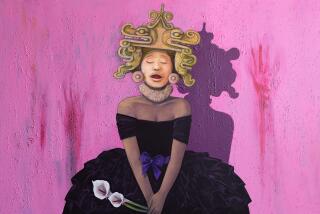Jenny Holzer still lets her art do the talking
Bellhops with luggage carts walked right by. So did teenage girls in tank tops. But a stylish thirtysomething businessman in the lobby of the Standard Hotel downtown couldn’t take his eyes off the words.
While talking on his cellphone, he stared at a 25-foot-tall, stainless steel LED tower that delivered from floor to ceiling a stream of one-liners, such as “Symbols are more meaningful than things themselves” and “Survival of the fittest applies to men and animals.”
The businessman might have recognized the LED tower as one of Jenny Holzer’s signature artworks, featuring the “truisms” and other sayings that have made her famous. But he had no way of knowing that the artist was sitting a few mod lounge chairs away: dressed plainly in black jeans and a dark shirt, wearing her brown hair long and loose and talking about her work with a self-deprecating sense of humor.
“One of the glories and terrors of working in public is that you do see if your output means anything to anyone,” said Holzer, 59, glancing at the man on the phone. “Is the subject matter relevant? Is there feeling in the content? Or am I making pollution?”
Though she talks as if the verdict is still out, the art world has reached something of a consensus about her work. Holzer, who lives in a farmhouse in Hoosick, N.Y., is in town this week to accept an award from the Museum of Contemporary Art for distinguished women in the arts, adding to her long list of honors and the honorary degrees that she calls “mock doctorates.”
A critically acclaimed survey of her work, which began at the Museum of Contemporary Art in Chicago in fall 2008, is finishing its European tour.
And over the years Holzer’s works — which range from the hopefully durable (sayings engraved on granite benches) to the highly ephemeral (xenon light projections of words adrift on ocean waves) — have appeared not just in English but Spanish, French, Italian, German, Polish, Russian, Korean and Japanese.
So what’s it like for an artist at this stage in her career to see her works — or words — everywhere?
“It startles me sometimes,” said Holzer, who winced at a few of her old sayings as they scrolled past at the Standard. “And it has funny side effects. When my daughter was young, she thought all electronic signs were mine.”
Holzer notes that working in public spaces has been one of her goals since the 1970s, when she was in the independent study program at the Whitney Museum in New York and took to the streets with wheat paste and posters of her truisms.
Even though she ultimately placed her work in galleries and museums, she often describes the power of that anonymity — of remaining a “shadowy” figure while the work stands in plain view — in glowing terms.
This week she explained it simply: “I tend to like it when people are thinking it’s not art — or to be more precise, when they’re not thinking about anything except the content.”
From the start many of her slogans, inspired by political and philosophical readings, had an anti-establishment or feminist bite. (“Abuse of power comes as no surprise” is one of the most widely recycled.)
This past decade, she has not been writing her own material but using texts by poets like Henri Cole and Wislawa Szymborska or else displaying political documents.
She has a soft spot for the aphorisms of dictators. “Mao was great. Lenin had some good ones. Lots of people in charge make good, short, end-all-and-be-all pronouncements,” she says, praising their concision as a way, perhaps, of questioning their thoughtfulness.
Her newest work is her most explicitly political: LED displays and paintings based on declassified government documents that, despite being heavily blacked out by censors, reveal details about interrogation techniques in Abu Ghraib, the slaying of Iraqi civilians by American soldiers and other examples of wartime brutality. She finds much of her material online through websites like the National Security Archive.
She lends as well as borrows language, letting people use her words on hats or T-shirts. “I live with it because I’ve wanted and still want those sentences to wander around on the Earth,” she says. And she calls it “gratifying” to find images of her art installations and projections popping up on websites like Flickr or YouTube, as “people with camera phones give my ephemeral works a longer life.”
This is not just empty talk from an artist who has a way with words. Her generous and collaborative spirit — what might be called an open-source model in the software world — was tested recently when a man or woman (Holzer calls it “a complete mystery”) began sending out messages from a Twitter account under her name “jennyholzer.”
This pseudo-Holzer has posted a real, though dated, picture of the artist online and blasts Holzer’s aphorisms to a group of over 15,000 followers. Even seasoned art critics like Adrian Searle of the Guardian have been fooled into thinking the tweets are coming from Holzer herself.
Though another artist might be quick to use the words “copyright infringement,” Holzer does not sound litigious. She even sounds respectful of this person’s chance to express himself or herself, if broadcasting via Twitter sayings written by someone else can qualify as self-expression.
“Maybe it’s somebody’s conceptual art project,” Holzer says. “I would be embarrassed to do it myself — I like being invisible. But when I look at the website, I think: Go, Not-Me.”
Perhaps this linguistic circularity has prepared Holzer for the particular irony of her current visit to Los Angeles: The award that Holzer will receive from MOCA on Wednesday is one that she designed for the museum in the 1990s.
The bronze plaque reads: “It is in your self-interest to find a way to be very tender.”
Holzer says she was happy to design the plaque for MOCA as a way to support female artists, like past recipients Yoko Ono and Barbara Kruger. Still, she admits it’s peculiar to be on the receiving end of her own work.
“Too bad I’m not getting an Ono or Kruger,” she says with a laugh.
Then, sounding more philosophical and more like the trusted and verifiable author of her own truisms, she adds, “It’s interesting. I contributed what will be given to me.”
More to Read
The biggest entertainment stories
Get our big stories about Hollywood, film, television, music, arts, culture and more right in your inbox as soon as they publish.
You may occasionally receive promotional content from the Los Angeles Times.






